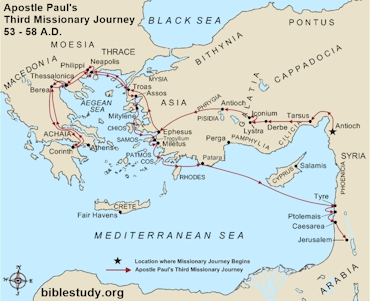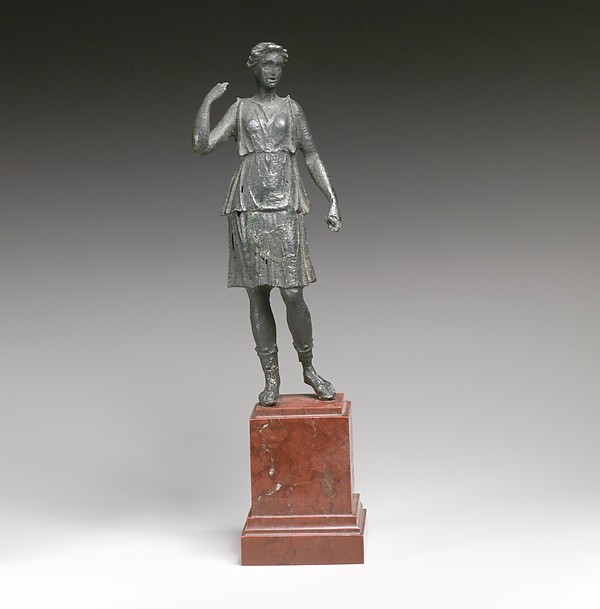

Paul has been long “on the road.” Five years almost for this missionary trip. He wants to be back in Jerusalem for Pentecost. His coastal-trader ship sailing down the west coast of Asia seems to lay over at every port. In his hurry, he doesn’t stop at Ephesus. Thirty miles south the ship harbors briefly at Miletus. Paul can’t help himself. Almost three years of teaching at Ephesus allowed deep bonds to form with the elders. Paul sends one of his associates to bring the elders to him. It will be, he expects, their last meeting.
They assemble outside in an open area often used for trade. About a dozen men. Young and old. Paul greets each with a hug and broad smile. Late winter winds are blustery, swirling leaves and debris over trampled grass pockmarked with holes of dirt. The Aegean, less than a hundred yards away, has turned choppy. Some elders squat, others stand, eager to hear what Paul has to say on this late winter day.
MINISTRY REMEMBERED
“When they came to him, he said to them: ‘You yourselves know how I lived among you the entire time from the first day that I set foot in Asia, serving the Lord with all humility and with tears, enduring the trials that came to me through the plots of the Jews. I did not shrink from doing anything helpful, proclaiming the message to you and teaching you publicly and from house to house, as I testified to both Jews and Greeks about repentance toward God and faith toward our Lord Jesus'” (Acts 20:18-21).
He remembers with them. Knowing Jews will malign him to them, he reminds them how he conducted himself. Humbly in all things. Tears spilled over the unrepentant. Trials endured from the Jews’ plots against him. Through it all, in public and in house, he never surrendered to attacks. Incessantly he proclaimed “repentance toward God and faith in our Lord Jesus.” Heads nodded in agreement. Smiles appeared at mention of Paul’s perseverance.
But the future would likely not be as bright . .
FUTURE PREDICTED
“’And now, as a captive to the Spirit, I am on my way to Jerusalem, not knowing what will happen to me there, except that the Holy Spirit testifies to me in every city that imprisonment and persecutions are waiting for me. But I do not count my life of any value to myself, if only I may finish my course and the ministry that I received from the Lord Jesus, to testify to the good news of God’s grace. And now I know that none of you, among whom I have gone about proclaiming the kingdom, will ever see my face again. Therefore I declare to you this day that I am not responsible for the blood of any of you, for I did not shrink from declaring to you the whole purpose of God’” (Acts 20:22-27).
Though he loves Jerusalem, the city won’t be a friendly place. He goes to it because the Spirit compels him. And, though he doesn’t know what will happen to him, the same Spirit tells him prison and persecution await in every city. Darker storm clouds are gathering.
Elders’ faces have turned solemn. Several warn Paul not to go. He’ll hear none of it. “I don’t consider my life worth anything to me. I’m determined to finish this race and complete the ministry I received from the Lord Jesus. I will testify to the good news of God’s grace!”
Paul’s stern determination softens. His hands, raised defiantly against enemies, fall to his side. “I know none of you, among whom I’ve proclaimed God’s kingdom in Christ, will ever see me again.” This is what the elders feared: a final farewell from the man they loved, a man God used to bring them into the kingdom. Especially now, Paul takes his responsibility with utmost seriousness. He has proclaimed God’s whole purpose to them: he’s not responsible for their blood.
But he does have a warning, Because just as his future sounds ominous, so, in fact, does theirs . . .
ELDERS CHARGED
“’Keep watch over yourselves and over all the flock, of which the Holy Spirit has made you overseers, to shepherd the church of God that he obtained with the blood of his own Son. I know that after I have gone, savage wolves will come in among you, not sparing the flock. Some even from your own group will come distorting the truth in order to entice the disciples to follow them. Therefore be alert, remembering that for three years I did not cease night or day to warn everyone with tears. And now I commend you to God and to the message of his grace, a message that is able to build you up and to give you the inheritance among all who are sanctified. I coveted no one’s silver or gold or clothing. You know for yourselves that I worked with my own hands to support myself and my companions. In all this I have given you an example that by such work we must support the weak, remembering the words of the Lord Jesus, for he himself said, ‘It is more blessed to give than to receive'” (Acts 20:28-35).
They listen, Paul’s words worrying them, then birthing determination. They must live like vigilant shepherds, keeping watch over the flock. They are Holy Spirit-made overseers; he will be their resource. Their calling isn’t casual. The flock of believers in the city isn’t theirs. It’s a flock “bought with the blood of [God’s] own Son.” The elders hear the gravity in Paul’s charge–a charge made most solemn, because the price paid for the people is most precious to God.
And they have a model to emulate. Paul reminds them how unceasingly, with tears streaming down his face, he had warned everyone of God’s wrath and the need to repent. They must do the same. For this great work, Paul commends them to God and the word of his grace that can build them up. Nor must they think their leadership, however weighty, is a means to financial gain. Paul, holding out a workman’s hands to them, had striven to support himself and help the needy. They must follow his example.
With urgency. Because after he leaves, Paul warns, men like savage wolves will come (some from within the church!) making perverse claims and trying to entice the believers to follow them in their lies. They must stay on alert; the matter for the church is one of life or death.
“When he had finished speaking, he knelt down with them all and prayed. There was much weeping among them all; they embraced Paul and kissed him, grieving especially because of what he had said, that they would not see him again. Then they brought him to the ship” (Acts 20:36-38).
Paul falls silent. The wind blusters. The only sounds anyone hears now are of the sea. Then, without a word, Paul kneels, stiffly on weary legs and hard ground. Paul’s prayer for them bring tears, which flow freely, unashamedly, as Paul’s “Amen” brings them all to their feet hugging and kissing Paul. Their sorrow weighs heavy as they escort him–for the last time–to his ship.
* * *
No apostles among my readers. But, leaders, nevertheless. Worship leaders, small group leaders, parents who lead families, the primary Christian witness among co-workers. Think of it: most of us exercise some form of leadership among others.
I used to as a pastor. My congregation has shrunk. Now it’s my family (and that in limited way due to my illness)–and you, to some extent, who regularly read my blog. I say all that just to include myself in the “most of us exercise some form of leadership among others” group.
Let’s suppose we’re meeting with our small group or family or co-workers for the final time. Will we be able to remember with them how we tried to humbly serve the Lord and speak his Word among them? Will we be able to say our life is worth little, except to finish our course of ministry for the Lord, no matter the cost? Will we be able to urge them to keep watch over one another, so they’re not led astray into lies? Will we naturally pray with them and for them?
If we want to be able to have that kind of farewell, today’s a good day to start getting ready. Because someday that goodbye will come.
{Note: Personal, “colorful” touches my addition.)


Recent Comments